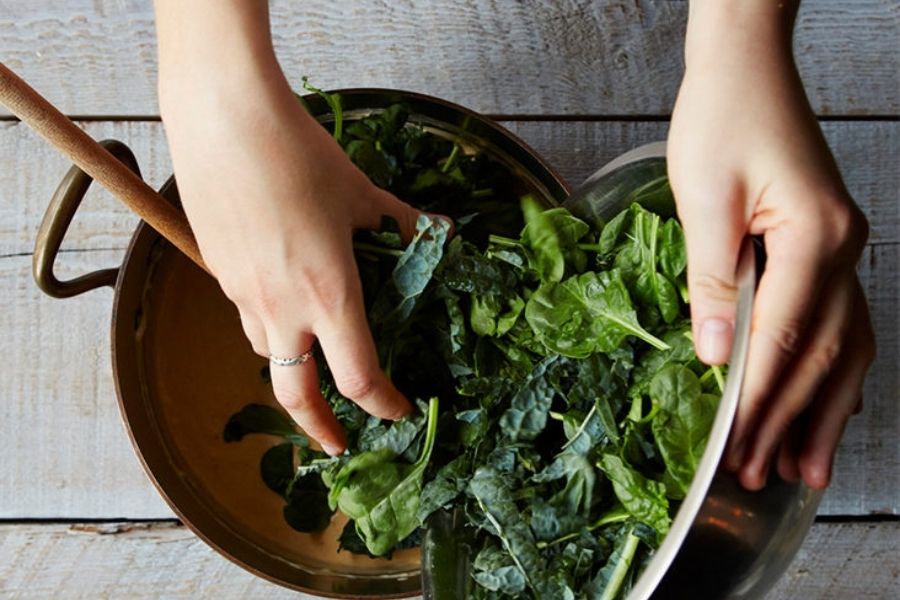Spinach has many nutrients, and it is believed to be a very healthy vegetable. You may be thinking that how come this green leafy and nutritious vegetable can harm our health. However, spinach is one of the healthiest vegetables, which has a powerful nutritional profile. But anything taken in moderation is good, but excess intake can lead to many health issues. And these side effects of eating too much spinach are mentioned in the article.
Spinach has a high nutritional value. It is rich in vitamins A, C, and K, folic acid, magnesium, iron, and manganese. One serving that is 100 grams of spinach contains 23 calories, 3 grams of proteins, 2 grams of fibers, and 4 grams of carbs. The fibers help decrease the hunger and urge to eat sweet and lower the risk of high cholesterol, high blood sugar, heart diseases, and digestive conditions like constipation.
Spinach is rich in oxalates and vitamin K. And excess intake can lead to the formation of kidney stones and interfere with the blood thinner with many other health issues. This leafy vegetable is a full package of nutrition and prevents you from diseases. Only if taken in a limited amount, as excess can cause problems mentioned below.
5 Side Effects Of Eating Too Much Spinach
1. Hinder Mineral Absorption

Oxalate is an antinutrient that can inhibit mineral absorption. Oxalic acid binds with zinc, magnesium, and calcium; thus, the body doesn’t absorb enough nutrients and leads to a mineral deficiency. Spinach also has oxalate, which hinders the absorption of calcium. Oxalate and calcium are both present in this veggie, and overconsumption of it may weaken calcium absorption.
When taken with milk, the spinach doesn’t have much effect on calcium absorption. But only one-tenth part of calcium is absorbed by the body as milk calcium. Oxalate also reacts with iron and hinders the iron absorption by forming the crystal.
2. Stomach Problems

As our body needs time to digest the extra spinach and cannot metabolize at once, eating too much spinach can cause a build-up of gas, bloating, and cramps. Due to high fibers in spinach, over-consumption can lead to diarrhea, abdominal pain, and fever.
3. Kidney Stones

Oxalate forms the stone in our body if taken in large amounts. The stone is formed by increased oxalate in the urine. This compound is in a higher amount in spinach, i.e., 100 grams of spinach contains 970 milligrams of oxalate. The oxalate concentration can be reduced by boiling spinach to prevent stone; you can combine spinach with curd or calcium-based food.
4. Gout

Spinach has high purine content that aggravates gouty arthritis and may lead to joint inflammation, pain, and swelling. There is an absence of a significant association between the intake of purine-rich vegetables and gout. Therefore, consult the doctor first as this leafy vegetable can interfere with some medication. Spinach can cause low blood pressure and very low blood sugar levels, making an issue for the people on medication.
5. Interfere With Blood Thinners

Consuming spinach while you are in anticoagulating medicine is not a good idea. Anti-coagulating medication is prescribed to people who are more likely to form harmful blood clots. The amount of vitamin K is very high in spinach, which reacts with anticoagulation drugs. Heat increases the absorption of the nutrients; therefore, cooked spinach has higher vitamin K levels.
One cup of raw spinach has 145 mcg of vitamin K, whereas half of the cooked spinach contains 444 mcg. The binding of anticoagulation drugs with vitamin K affects the action, reducing blood thinners’ effectiveness and other coagulation factors. The blood thinners are given to prevent the onset of stock. Vitamin K plays an important role in forming the blood clot in our body, so vitamin K reduces the blood thinners’ effectiveness.
Conclusion
Moderation is the key, as spinach is the most nutritious vegetable available. To avoid the side effects of eating too much spinach, consume it in a moderate amount. It is recommended to eat up to 100 grams of spinach in a day. Spinach is a very healthy vegetable, but you may have to avoid the spinach intake in kidney stones. A healthy person should add spinach to their daily diet.







